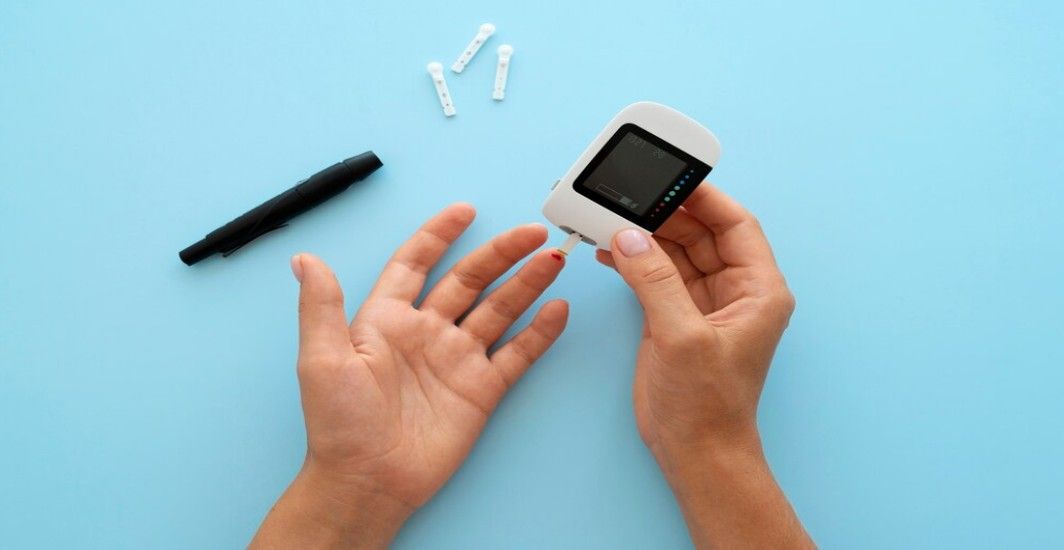Diabetes Management
Is Increased Thirst A Sign Of Diabetes?
6 min read
By Apollo 24|7, Published on - 05 September 2023, Updated on - 22 February 2024
Share this article
0
0 like

Diabetes is a chronic condition that affects the body's ability to regulate blood sugar levels. There are different types of diabetes, including type 1 and type 2, with varying causes and treatment approaches. It is essential to recognise the symptoms of diabetes early on to prevent complications and manage the condition effectively. While most people are familiar with common symptoms like frequent urination and fatigue, increased thirst (also known as polydipsia) can also be a warning sign of diabetes. Let's know more about this symptom in this blog.
Symptoms of Diabetes
Some of the most common symptoms of diabetes include:
1. Increased Thirst
- Excessive thirst is a common symptom of diabetes. When blood sugar levels are high, the body tries to flush out the excess sugar through urine. As a result, you may experience frequent urination and an unquenchable thirst.
- Excessive thirst can lead to dehydration, which can further worsen the symptoms of diabetes.
- Increased thirst can also be one of the symptoms of diabetes insipidus, which is characterised by an inability of the body to properly regulate fluid balance.
- Diabetes insipidus can be caused by various factors, including damage to the hypothalamus or pituitary gland, certain medications or genetic factors. It is treated with medications that help the body retain fluids and regulate urine production.
2. Frequent Urination
- Frequent urination is another symptom of diabetes that is closely related to increased thirst.
- Excess sugar in your blood triggers your kidneys to work harder to filter and remove the sugar, leading to more urine production.
3. Unexplained Weight Loss
- People with diabetes may experience rapid weight loss despite a regular diet.
- This occurs because the body is unable to properly utilise glucose for energy, so it starts breaking down fat and muscle for fuel.
4. Fatigue and Weakness
- Diabetes can cause chronic fatigue and weakness due to the body's inability to effectively convert glucose into energy.
- This can leave individuals feeling tired and lethargic throughout the day.
5. Blurred Vision
- High blood sugar levels can affect the shape of the lens in the eye, leading to blurred vision.
- This symptom may be temporary and improve once blood sugar levels are under control.
While these symptoms are common, it's important to note that not everyone with diabetes will experience all of them. If you notice any of the aforementioned symptoms, it's best to consult with a diabetologist for a proper diagnosis.
Causes of Increased Thirst in Diabetes
Here are some key factors contributing to increased thirst in diabetes:
1. High Blood Sugar Levels and Dehydration
- When blood sugar levels are high, the kidneys work harder to remove the excess glucose from the body. This leads to increased urination, which can result in dehydration. Simultaneously, dehydration triggers the body's thirst mechanism, further increasing thirst.
- High blood sugar can also cause dry mouth, which further increases thirst. Elevated blood sugar levels can affect saliva production, leading to a dry and sticky sensation in the mouth, contributing to increased thirst.
2. Impact of Increased Glucose in the Bloodstream
In diabetes, the body either does not produce enough insulin or cannot effectively use the insulin it produces. As a result, glucose builds up in the bloodstream, leading to hyperglycaemia. This excess glucose can cause cellular dehydration, triggering thirst.
3. Relationship Between Increased Thirst and Frequent Urination
Frequent urination is a common symptom of diabetes because the kidneys attempt to remove excess glucose from the body. The more frequently you urinate, the more fluid your body loses, leading to increased thirst as a natural response.
Dietary Recommendations for Diabetics to Manage Thirst
To manage thirst and prevent dehydration, diabetics should follow specific dietary recommendations. Here are some key recommendations:
- Choose Fruits and Vegetables with High Water Content: Opt for hydrating foods like watermelon, cucumber, strawberries, oranges and lettuce. These foods not only provide essential nutrients but also contribute to your overall hydration.
- Stay Hydrated with Beverages: Herbal teas and infused water are great options to stay hydrated without adding extra sugar or calories. You can experiment with different flavours by adding slices of lemon, cucumber or mint leaves to your water.
- Limit Sugary Drinks: Avoid sugary beverages like soft drinks, fruit juices and energy drinks as they can cause a spike in blood sugar levels and lead to dehydration.
- Moderate Caffeine Intake: Excessive caffeine consumption can have a diuretic effect on the body, contributing to dehydration. If you enjoy a cup of coffee or tea, make sure to balance it with an adequate intake of water.
Hydration Tips for People with Diabetes
Hydration is crucial for everyone, but it holds even greater importance for individuals with diabetes. To ensure optimal hydration, here are some essential tips:
- Maintain Adequate Fluid Intake: Aim to drink at least 8–10 glasses of water daily. Spread out your water consumption evenly throughout the day to avoid excessive intake during specific times.
- Monitor Urine Colour: Dark urine indicates dehydration, while pale yellow or clear urine suggests proper hydration.
- Pay Attention to the Timing of Fluid Intake: Drink water before, during and after physical activity to replenish lost fluids and prevent dehydration.
Preventing Dehydration in Diabetes
To prevent dehydration in diabetes and its complications, it is important to follow certain strategies and take necessary precautions.
- Regular Monitoring: Keeping a close eye on blood sugar levels using glucometers is crucial in preventing dehydration. High blood sugar levels can lead to increased thirst and urine output, which can result in fluid loss. By maintaining optimal blood sugar control, you can reduce the risk of dehydration. You can also get diabetes blood test done to ensure optimal blood sugar levels.
- Proper Intake of Medications and Insulin: It is important to take your diabetes medications as prescribed by your doctor. Missing doses or taking incorrect amounts can disrupt your blood sugar levels and increase the risk of dehydration. Similarly, proper insulin management is essential to prevent excessive thirst and fluid loss.
- Awareness of Environmental Factors: Environmental factors such as hot weather, high altitude or excessive physical activity can contribute to dehydration. It is important to be aware of these factors and take necessary precautions. Drink plenty of fluids, wear appropriate clothing and avoid prolonged exposure to extreme temperatures.
- Know when to consult a doctor: If you experience persistent symptoms of dehydration such as excessive thirst or dry mouth, it is important to seek medical attention. Dehydration can have serious consequences if left untreated, especially for individuals with diabetes.
Conclusion
Increased thirst can be a symptom of diabetes, and it is important to recognise and address this symptom promptly. Excessive thirst in diabetes, also known as polydipsia, can occur due to various reasons, including dehydration, dry mouth and hyperglycaemia. If you are experiencing excessive thirst along with other symptoms such as frequent urination, unexplained weight loss or fatigue, it is crucial to seek medical evaluation. Early diagnosis and appropriate treatment are essential for managing diabetes and its emergencies effectively.
For more information,
Consult Apollo's Expert Diabetologists
You can also try the Apollo 24|7 Diabetes Self-Management Tool to log your sugar values, track patterns, know all about food nutrition and more.
Medically reviewed by Dr Sonia Bhatt.
Diabetes Management
Consult Top Diabetologists
View AllFrequently Asked Questions
Can increased thirst be a sign of prediabetes?
Can increased thirst be a sign of prediabetes?
Is polydipsia always a sign of diabetes?
Is polydipsia always a sign of diabetes?
Are there any complications associated with excessive thirst and dehydration in diabetes?
Are there any complications associated with excessive thirst and dehydration in diabetes?
Can increased thirst occur in both type 1 and type 2 diabetes?
Can increased thirst occur in both type 1 and type 2 diabetes?
Is it normal to feel thirsty after taking diabetes medication?
Is it normal to feel thirsty after taking diabetes medication?
Leave Comment
Recommended for you
.jpg?tr=q-80)
Diabetes Management
Recognising the Early Signs of Diabetic Kidney Failure
Recognising the symptoms of kidney failure due to diabetes is crucial for early intervention and management. These can range from swelling and back pain to changes in urination patterns and severe confusion. If you experience any such symptoms, consult your doctor at once. Remember, alongside medical treatments, guided lifestyle modifications through initiatives like the Apollo Super 6 programme play a significant role in managing diabetes and its complications.

Diabetes Management
Pineapples & Diabetes: Is it Safe for Diabetics?
Pineapples, rich in nutrients, may impact blood sugar due to their carbs. With a medium GI of 59-66, moderation and pairing with protein are key. Opt for raw or grilled forms with lower GI, while canned or juice has higher values. Portion control and informed choices let diabetics enjoy pineapple while managing health.

Diabetes Management
Identifying Prediabetes Risk Factors
Prediabetes is a wake-up call that signals an adjustment in your lifestyle choices. Understanding the risk factors such as being overweight, ageing, having a family history of type 2 diabetes, and certain ethnic predispositions can help you take proactive measures. With regular physical activity, a balanced diet, and regular check-ups, you can keep prediabetes at bay and lead a healthier life.
Subscribe
Sign up for our free Health Library Daily Newsletter
Get doctor-approved health tips, news, and more.
Visual Stories

8 Fruits That are Incredibly Healthy for Diabetes
Tap to continue exploring
Recommended for you
.jpg?tr=q-80)
Diabetes Management
Recognising the Early Signs of Diabetic Kidney Failure
Recognising the symptoms of kidney failure due to diabetes is crucial for early intervention and management. These can range from swelling and back pain to changes in urination patterns and severe confusion. If you experience any such symptoms, consult your doctor at once. Remember, alongside medical treatments, guided lifestyle modifications through initiatives like the Apollo Super 6 programme play a significant role in managing diabetes and its complications.

Diabetes Management
Pineapples & Diabetes: Is it Safe for Diabetics?
Pineapples, rich in nutrients, may impact blood sugar due to their carbs. With a medium GI of 59-66, moderation and pairing with protein are key. Opt for raw or grilled forms with lower GI, while canned or juice has higher values. Portion control and informed choices let diabetics enjoy pineapple while managing health.

Diabetes Management
Identifying Prediabetes Risk Factors
Prediabetes is a wake-up call that signals an adjustment in your lifestyle choices. Understanding the risk factors such as being overweight, ageing, having a family history of type 2 diabetes, and certain ethnic predispositions can help you take proactive measures. With regular physical activity, a balanced diet, and regular check-ups, you can keep prediabetes at bay and lead a healthier life.

